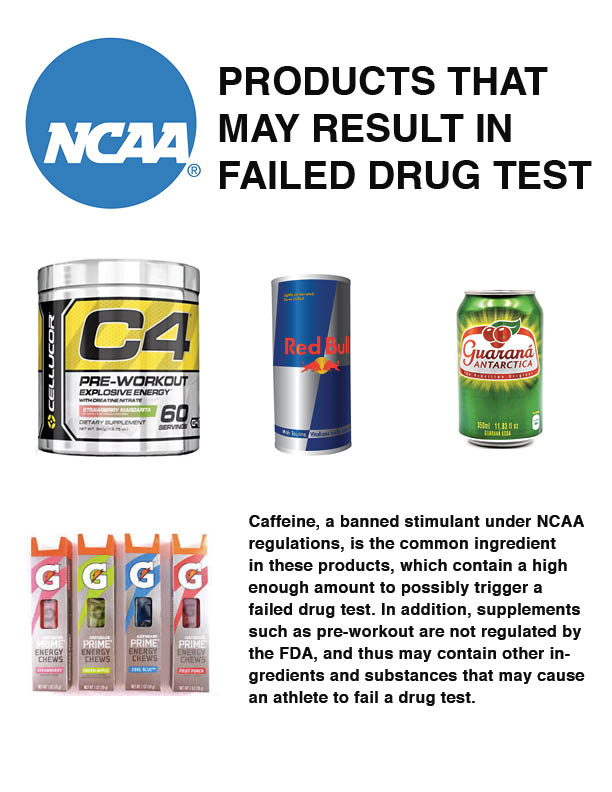Is caffeine illegal in NBA?

Can NBA players use caffeine
Generally speaking, caffeine is probably useful for most basketball players. But the trick is getting the right dosage of caffeine at the right time. Most guidelines suggest that roughly 3-9 mg of caffeine per kilogram of body mass consumed about an hour before an event is good enough to get this ergogenic effect.
Does Lebron James use caffeine
Lebron takes a pre-workout supplement that contains 200mg of caffeine, 6g of L-citrulline, 5g of creatine monohydrate, 1.6g beta-alanine, 200mg L-theanine, and 100mg phosphatidylserine.
Do NBA players have caffeine before games
"We're like baristas on game day," Forcier says. It's a Blazers game-day ritual, carefully timed so that when the pregame meeting starts 35 minutes before tipoff, the players have a hot, fresh cup of java in hand — their pregame pick-me-up.
Cached
Is it OK to drink coffee before a basketball game
Before competition, I suggest athletes don't use coffee as their caffeine source but instead drink caffeinated sports drinks or take caffeine tablets. For recreational athletes and athletes in a less serious block of training, 2-3 cups of coffee 60 minutes before exercise likely will enhance performance.
Is caffeine banned in any sports
Is Caffeine Prohibited in Sport No, caffeine is permitted in sports governed by the World Anti-Doping Agency (WADA). It is currently on WADA's monitoring list which means it is not prohibited but WADA is monitoring it in case it becomes an anti-doping issue in the future.
Why was caffeine banned in sports
According to a WADA spokesperson, the organization determined that caffeine no longer met at least two of three criteria for inclusion on the prohibited list. The criteria for banning a drug are that: It has the potential to enhance sport performance. It represents a health risk to the athletes.
Does Tom Brady use caffeine
Brady avoids foods that are known to cause inflammation, which is known to increase the risk of injury and organ damage, according to WebMD. He avoids dairy, sugar, gluten, refined carbs, caffeine and processed meats whenever possible.
Did Michael Jordan use caffeine
Did Jordan drink caffeine Jordan drank coffee before games, and it is believed that caffeine helped him focus and stay energized during his playing career. He would drink a hot coffee before putting on his uniform, continuing his pre-game routine.
Do pro athletes drink coffee
Endurance athletes have been reported to use caffeine. The benefits caffeine provides may be especially important for low arousal situations. Where a sustained response is required, such as endurance marathons, caffeine improves performance. Caffeine, when circulating through the body breaks down body fat.
Can athletes drink caffeine before a game
Time caffeine consumed prior to a game
After a comprehensive review of the effects of caffeine on sport-specific endurance performance in studies, it was concluded that to maximize performance benefits, caffeine should be consumed no more than 60 minutes before exercise.
Is caffeine illegal in the NFL
No, caffeine is permitted in sports governed by the World Anti-Doping Agency (WADA).
Is coffee banned in the NFL
Testing positive for excessive levels of caffeine was removed from the World Anti-Doping Agency banned list in 2004. The supplement has since become one of the most used in sport.
Is caffeine OK for athletes
Studies have shown that caffeine can benefit endurance performance, high intensity exercise, and power sports. However, it seems to benefit trained athletes the most. The recommended dose varies by body weight, but it's typically about 200–400 mg, taken 30–60 minutes before a workout.
Is caffeine legal in football
Even though caffeine is not prohibited in sport, there is the risk that a pre-workout or weight loss product will contain other prohibited stimulants (in addition to the caffeine). If athletes choose to use dietary supplements in spite of the known risks, USADA recommends using only third-party certified supplements.
Can NFL players have caffeine
Athletes and football players need to limit the amount of caffeine because too much of it can cause adverse effects. Very high doses can cause unpleasant side effects like: Headaches.
Was caffeine banned in sports
Is Caffeine Prohibited in Sport No, caffeine is permitted in sports governed by the World Anti-Doping Agency (WADA).
Is caffeine illegal for athletes
Is Caffeine Prohibited in Sport No, caffeine is permitted in sports governed by the World Anti-Doping Agency (WADA).
Is caffeine allowed in sports
Today, Olympic athletes are permitted to enjoy a cup of coffee before competing. But between 1984-2004, the World Anti-Doping Agency (WADA) banned high concentrations of caffeine from all Olympic events. Monitoring caffeine levels is uniquely complicated.
How much caffeine is allowed in sport
Calculating Caffeine Amounts
The acceptable caffeine limit for NCAA athletes is 15 micrograms per milliliter of urine. The IOC allows its athletes up to 12 micrograms per milliliter of urine before the substance is considered illegal.
Why is caffeine not banned in sports
Because performance-enhancing doses of the stimulant were found to be almost indistinguishable from normal consumption, the WADA pulled the caffeine restrictions to prevent penalizing athletes unfairly, reports the Washington Post.
How much caffeine is illegal in sports
It is now widely considered an “ergogenic aid”, or something that enhances performance. The NCAA is the only organization that restricts the amount of caffeine in an athlete's system by limiting urine concentrations to 15 ug/mL, which equates to ~500mg caffeine or ~6 to 8 cups of coffee 2 to 3 hours before an event.
Is caffeine cheating in sports
No. If anything, it increases it. With caffeine stimulating muscles and nerves while clearing away waste products, you're able to do more work and put out more effort. If you're able to put out more effort, you'll have increased training effectiveness and gain more from the session.
Is caffeine a drug in sports
Is Caffeine Prohibited in Sport No, caffeine is permitted in sports governed by the World Anti-Doping Agency (WADA).



